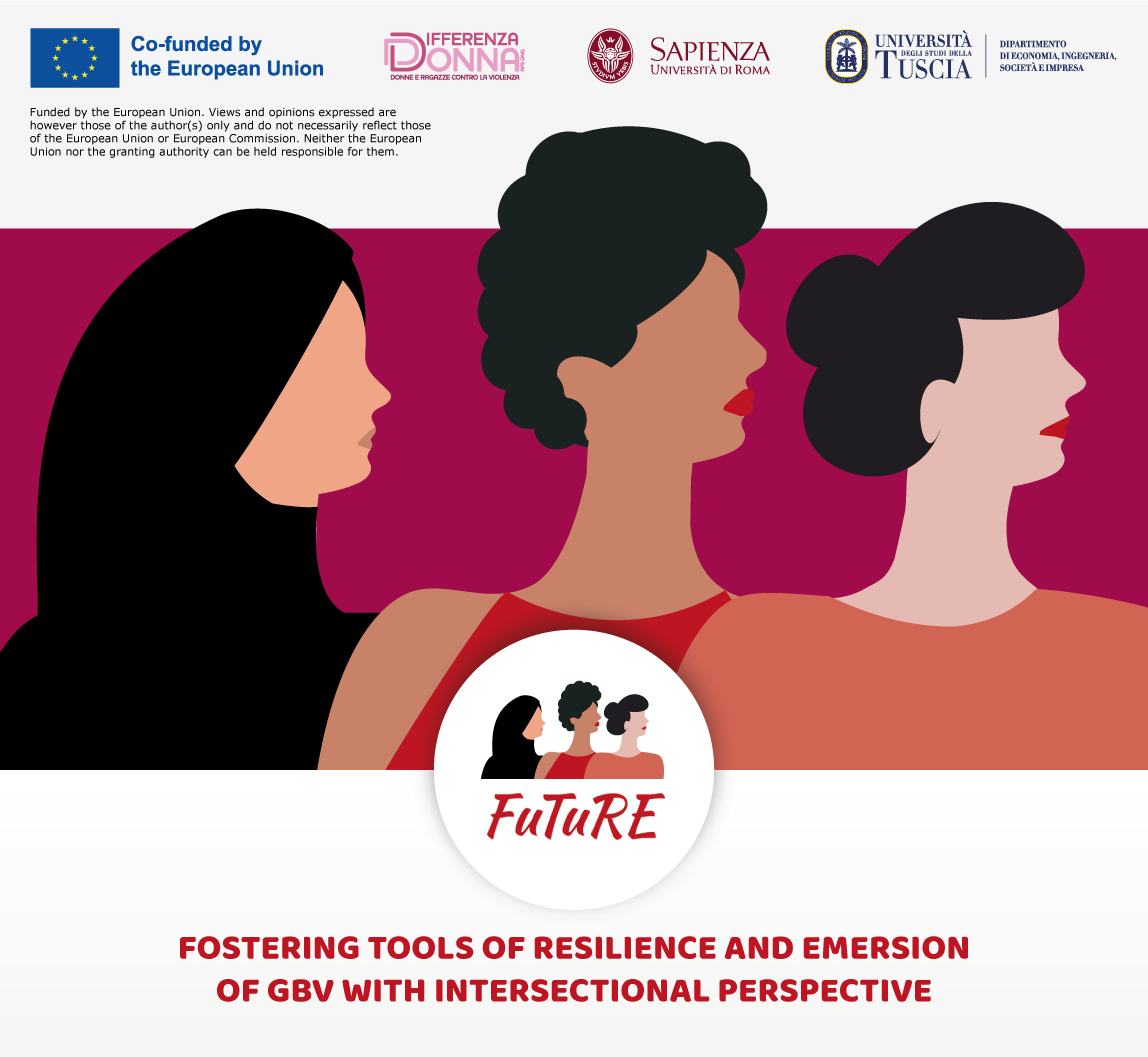
FuTuRE – “Fostering Tools of Resiliance and Emersion of GBV with intersectional perspective" is a European project financed with CERV (Citizen, Equality, Rights and Value) funds that sees Differenza Donna, lead partner, and University of Tuscia and University of Rome "La Sapienza", partners, engaged in the prevention and fight against gender-based violence, with a specific focus on violence in intimate relationships and multiple discrimination, through the updating and strengthening of procedures and methodologies for assessing the risk of recidivism and self-assessment of risk, starting from a gender, intersectional and inclusive perspective of children's rights, also taking into account the critical issues that have emerged following the COVID-19 pandemic.
 This will involve professionals in a common network, reinforcing knowledge, methodologies, skills and creating shared thinking to produce change and offer adequate responses in an integrated, multi-agency perspective.
This will involve professionals in a common network, reinforcing knowledge, methodologies, skills and creating shared thinking to produce change and offer adequate responses in an integrated, multi-agency perspective.
Within the framework of a European Union project, in 2003 Differenza Donna introduced, validated and disseminated in the Italian context the Guide to Spousal Assault Risk Assessment (SARA-C project, Daphne programme 2003). Subsequently, within another EU-funded project, it developed a scale for risk self-assessment (ISA - Increasing self-awareness, Daphne programme 2006).
Today, about 20 years later, male violence against women perpetrated in intimate relationships is manifested through ancient as well as new ways of acting it and exerting control over women (e.g., through Internet, digital devices and social media), just as increased knowledge and awareness of the risks associated with intersectionality has increased, while economic and social phenomena have exacerbated violence against women, in particular the 2008 economic crisis and the COVID-19 pandemic.

Thanks to the FuTuRE project the experience gained with the previous European projects Daphne SARA-C and ISA coordinated by Differenza Donna in the 2000s, and their results, will be further developed by integrating the changes in the dynamics of male violence against women and highlighting the new challenges and strategies that need to be addressed. In this way, it will be possible to provide women with an accurate risk assessment to strengthen their awareness and facilitate effective accompaniment and access to rights, the institutional network and local services.
FuTuRE aims, in fact, to respond to specific critical issues that have emerged from Differenza Donna's experience of more than thirty years of work in prevention, combating gender-based violence and supporting women, criticalities also highlighted by reports and studies at national, European and international level.
According to the EIGE (European Institute for Gender Equality) it is "recommended that risk assessment tools be used in combination with a variety of other sources of information, including women's characteristics and perceptions of risk" and "risk assessment tools must be sufficiently flexible and dynamic to take into account the unique risks that may be associated with specific groups of women such as migrant women, refugee women, older women, lesbian, gay, bisexual, transgender, queer and intersex individuals and women with disabilities' (Risks Assessment and management of intimate partner violence in the EU, 2019).

Although the EIGE and other national and international bodies and organisations indicate how these aspects should be taken into account in risk assessment procedures, no specific and detailed guidelines on the subject have yet been produced.
For this reason, FuTuRE proposes to develop guidelines for the integrated use of up-to-date risk assessment tools and methodologies that will be essential for all professionals dealing with women, from anti-violence centres to law enforcement agencies, from the judiciary to social services, in order to define synergic risk assessment methodologies and procedures, without underestimating aspects that could be important alarm bells to prevent the recurrence of abuse and to avert feminicide. This makes it possible to envisage effective strategies for risk management and for the reduction and elimination of future violence, using a shared language that can be understood by all.
GUIDE LINES for the assessment and self-assessment of the risk of recidivism of male violence against women in intimate relationships:
Download FuTuRE_Guidelines_ENG.pdf





 Iscriviti
Iscriviti